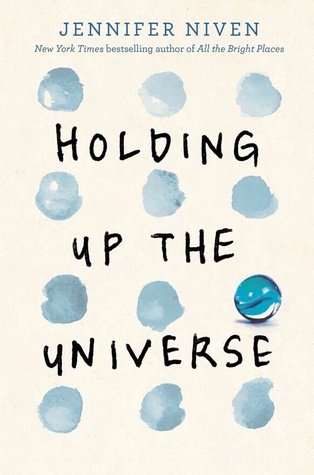
recap by Madison Comick, age 15
Holding Up the Universe by Jennifer Niven
A couple of Novembers ago, YA Book Club read All the Bright Places by Jennifer Niven. We thought it was literally the most amazing story we’d ever heard of. I think we’re all still fawning over that book. We were that in love with Violet and Finch (and we can NOT wait to see the movie). Recently, Niven created another story- this one is called Holding Up the Universe– and being undying fans of her writing since ATBP, we obviously jumped at the opportunity to read it for May’s meeting, hoping for a gripping- and, for some, a sad- story.
Before we go on about Holding Up the Universe, meet Jack and Libby, Violet and Finch’s total opposite. (This is not an ATBP review, so we can’t exactly get into this topic right now- so I suggest you read the book). Jack is this popular guy with “swagger” and everything going for him- but here’s the catch. He has prosopagnosia, which is basically a fancy tongue-twister that means he can’t recognize a face to save his life- at least not like a normal person. (This also means he has something in common with Brad Pitt. Yeah. Shocker.) Libby is America’s Fattest Teen and has been viewed and judged billions of times by people around the world on YouTube. Now it’s her junior year and she’s lost enough weight to leave home and go to public school. She’s thinks it will be AWESOME and “no one will recognize me, I swear.” But then Jack plays a joke on her as a dare. Then their relationship begins.
Our opinions were very similar- (but please acknowledge the fact that there were only two people present this past meeting). We both thought Jack was self- pitying, obnoxious, selfish, and behaved in an overconfident manner. We viewed Libby as confident, mature, and outspoken. Our opinions of the two did not change at all through the story. They were the most developed characters- the ones with hopes, dreams, and fears. And they were the only ones with obstacles- Libby felt invisible and unwanted. Jack… well, Jack needed to get over himself.
He needed to accept things: like the fact that his friends were utter JERKS, including his girlfriend. And the funny thing was, he was only able to recognize them because they were jerks. Except Libby. He recognized Libby because of her “soul”- no offense, but this cued an eye roll. What was so special about Libby that caused him to recognize her? This is a question to which we will never know the answer.
We will also will never know the answer to how their relationship is impacted by other people in their lives. It was hard to pinpoint because we only know situational factors of their lives- their parents had certain problems, their friends had problems, but they weren’t exactly developed. In fact, the whole development of surrounding characters was underdone. They were all too similar and we couldn’t get a good grasp on them.
We also sometimes couldn’t get a good grasp on Jack and Libby. The story was told in alternating points of views- and we understood (sort of) why she did it. That’s how ATBP was written, but the difference was that Violet and Finch were two totally different people- and she pinpointed that perfectly. But Jack and Libby were similar to the point where we’d lose our place in the story and forget who was talking. The attempt at two different perspectives was forced- just like their romance.
Really, everyone knew they were better off as friends. It seemed too quick and we disliked it because it seemed as though Niven was attempting to make a romance like Violet and Finch’s, which developed slowly and not over a few weeks.
So yeah, we weren’t exactly fans of the romance. But we loved a few other concepts of the story. The You Are Wanted flyers brought to the story the sense of empowerment- the fact that even with your problems, someone will love you. Libby’s desire to drive and dance and date implied every teen’s desire to experience something on their own for the first time- first guy, first kiss, first love, first everything. And Jack’s brother’s self expression showed that even little kids can be confident- but when he stopped expressing himself, it showed that not just teens are judging and being judged. So are young kids. Children and teens- and adults- are afraid of what people think. That was the most important lesson of all.
Overall, we were a bit disappointed. While I myself was hoping that the book would be similar to Violet and Finch’s story-(to be honest, in the sense that it was sad and would cause everyone to cry and wonder what exactly they’re even doing in life)- I was disappointed because Jennifer Niven had potential to make it into a great story, but she forced unnecessary ideas. If she hadn’t, we would have rated it 4 out of 5 stars. But she did, so Book Club has rated Holding Up the Universe an average of 1.1 stars out of 5 stars. What a bummer.
Find this book in our catalog: Holding Up the Universe
Call Number: YA FIC NIVEN, J
391 pages
